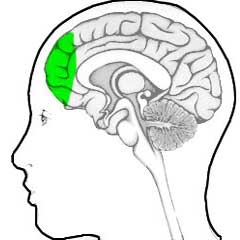In the Name of Allah, the Exalted!
The question regarding why hazardous games are forbidden (haram) or unrecommended(makrooh) can be answered from a philosophic and logic perspective as well as from a psychological and of this a medical one.
As fun as it may be, hazardous games influence the human psyche and even the forelock, called al-naseyah (in Arabic) – named in the Holy Quran – or medically speaking, the prefrontal cortex (in Latin):
In the Name of Allah, Most Gracious, Most merciful.
Does he not know that Allah does see?
Nay, but if he cease not We will seize him by the forelock –
The lying, sinful forelock –
(The Holy Quran: Surah Al-Alaq (Kapitel 96 – The Clot) verse 14-16)


The verses above tells us that humans will be dragged by their forelock and will be thrown in the fire of hell on the Day of Judgment if they don’t cease lying and commit sins.
A man’s forelock (or al-naseyah) is the center of planning, reasoning… and decision-making, such as to become angry and lie; which is medically proven and even taught in medical schools all around the world.
In other words, al-naseyah is the ‘government’ of our nervous system that gives order to our other body parts to carry out good deeds or to commit sins, such as by hitting someone or become angry.
So far it is too early to get into the subject of hazardous games since the linkage between this topic and al-naseyah isn’t obvious yet; therefore, another scientific aspect is needed in order to enable understanding of the existing correlation.
One of many medical studies (such as Prefrontal Cortex Deactivation During Video Game Play, by the Japanese Dr.Goh Matsuda and Dr.Kazuo Hiraki, source) carried out, have shown that those playing video games and watch television a lot get a decrease in their forelock activity; which is one of the reasons why one cannot leave the TV to carry out more important things, such as doing homework or perform the prayers, after having watched TV long enough. On every such occasion we say to ourselves:”Ahh… I’ll get up a bit later.” This excuse is used most of the time and its true cause is that as soon as the activity in the forelock shrinks the whisperings of Satan will commence and distract the person in order to hinder him from thinking, planning, and therefore prioritize more important things in life. This is why youths tend to become more addicted to video games and TV; since their ability to think, plan and decide gets inactivated and as a result they “surrender” themselves to the TV’s entertaining role.
Now is the time to start with the main topic, namely hazardous games.
Let us take the example of card games, where luck decides most of the game’s outcome.
Many medical studies, such as Why do we gamble and take needless risks?, by Professor Keith Kendrik, a British scientist (source), have shown that each time a person wins the forelock gets activated, whereas each time he loses the forelock gets inactivated. This indicates that each time a person loses he gets deeper and deeper into a downwards state that doesn’t lead to any reward for the brain’s hormonal activity but instead results in the inactivation of our thinking and decision ability.
This is among the many reasons why a card game is taken seriously even though no money has been bet nor are any enemies playing along, other than friends.
The diminishing activity in the forelock leads to the fact that one cannot think clearly and at the same time wants to get back the reward-sensation one used to get on every winning occasion. When an individual doesn’t get any reward he becomes desperate, becomes more and more jealous and as a result gets angry. It is at this specific time that Satan’s whispering takes such a full effect that the angry person would react verbally (by swearing for instance) or moreover, react physically and become violent. It is interesting to know that the central site of the human intellect is the naseyah. As soon as a person’s intellect isn’t controlled by one’s own ego (nafs) he gets exposed to risks to commit sins due to the fact that the negative feelings above dominate the brain’s activity.
This is the reason why in desperate situations, the person often sells his clock, his furniture, his car and even his own child (which has been seen in extreme cases) after having lost more and more money and fallen into deep debts.
Of course our topic isn’t about money here, but from the example given above, one finally understands why our 6th Imam, Imam Sadiq(A.S.) said:
“One shall not take a ‘path’ that leads to commit sin(s)” [instead of simply saying that one shall not commit sin(s)].
Actions that lead a person to a ‘place’ or a ‘state’ – where sins are usually committed (in this case hazardous games) – should be avoided at all cost so that a series of following and growing sins aren’t carried out.
But still, let us assume that a person still chooses to play card because he is certain that he can control his temper by avoiding becoming jealous and angry each time he loses. This leads us to the question:
“If he succeeds in not becoming angry what guarantees that the others around the table don’t fall into such negative feeling after each loss or stressful situation?”
To answer this question let’s compare this situation to one of Fatima al-Zahra’s (A.S.) sayings, the daughter of the Holy Prophet Mohammed(S.A.A.S.): that a female doesn’t wear libas al-taqwa (i.e. hijab) exclusively for Allah and herself; she wears it also so that other people wouldn’t see her and as a result fall into sins. Thus, by reasoning in such a logic manner, she even took into account the consequences that a lack of hijab could lead to in a society. The same principle goes for hazardous games; an individual might believe that he won’t fall into risks but should instead take into account the fact that his friends might become victims of such risks. This is how a true ‘responsible’ Muslim person acts.
Finally, by taking into account the medical and psycho-neurological aspect of this topic (even by the help of the saying of Zahra(A.S.)), we should classify hazardous games at least as makrooh (unrecommended) or preferably as haram in order to avoid a series of sins that can occur to the friends playing around the table or even to ourselves.
Filed under: 2.3.9. Why are hazardous games haram/makrooh? | Tagged: abdul basit, activity, ahlulbayt, al-naseyah, ali, allah, audio, blog, brain, center, control, deed, dr, evil, fatima, forelock, gamble, game, god, goh matsuda, hassan, hazardous, heartscience, hossein, hussein, inactivate, intellect, islam, jesus, kazuo, keith kendrik, mahdi, makrooh, medical, medicine, merciful, mind, money, nafs, neurological, path, peace, philosophy, prefrontal cortex, psychological, quran, religion, sadiq, satan, science, scientist, shia, sin, stress, verse, video, zahra | Leave a comment »



